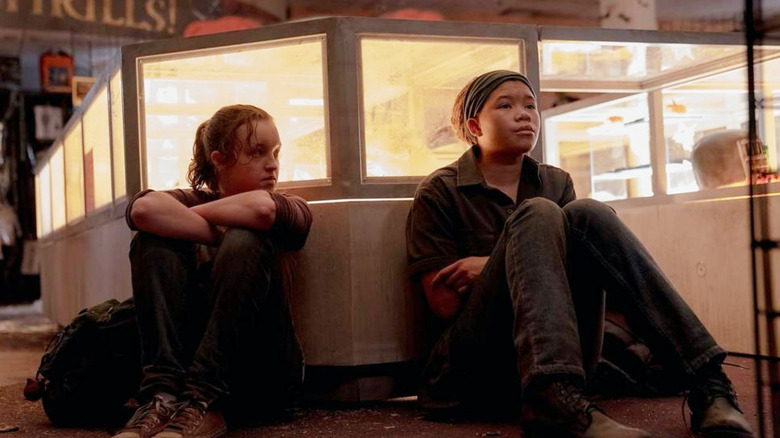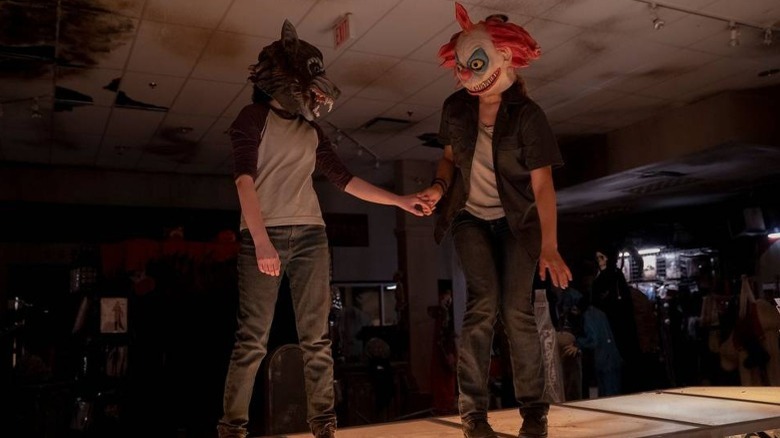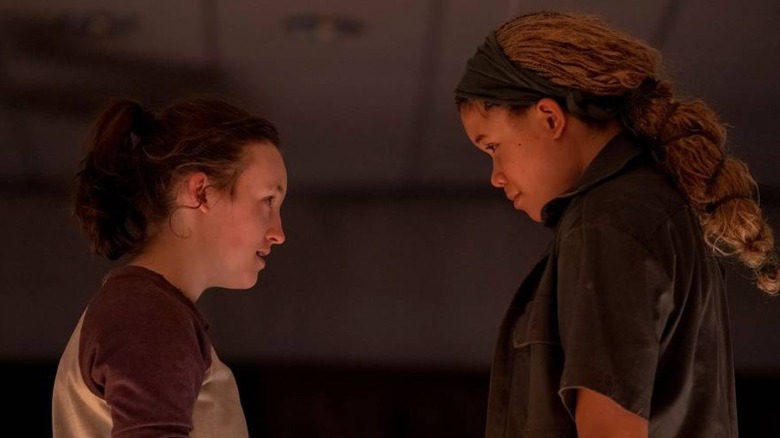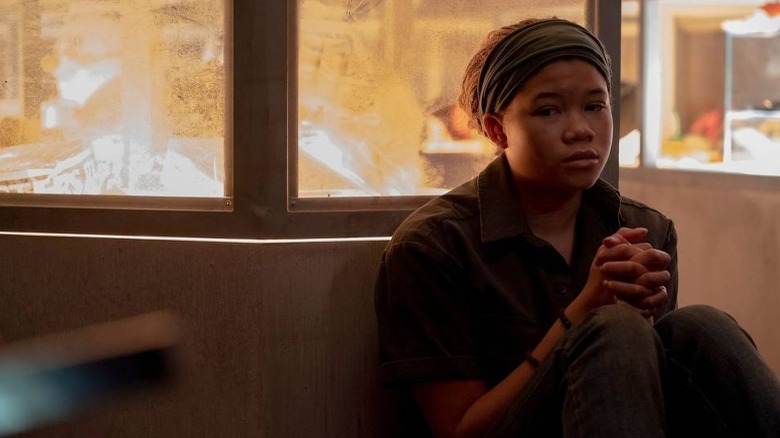How Ellie's LGBTQ Reveal In The Last Of Us Episode 7 Differs From Left Behind DLC
This article contains spoilers for "The Last of Us" on HBO as well as the video game source material.
It becomes more clear with each passing week that "The Last Of Us" is, on many levels, about queer survival. Not surviving forever — this show's unflinchingly tragic world buries its gays along with pretty much everyone else — but surviving long enough to find acceptance, connection, and some form of love. This week, in an episode that took place almost entirely in flashback, we saw Ellie (Bella Ramsey) find that love with her best friend Riley (Storm Reid) for the briefest of moments. The pair shared a sweet first kiss in a scene that echoes one from the game's downloadable content add-on, "The Last Of Us: Left Behind."
"The Last Of Us" clues audiences into Ellie's sexuality organically, in the context of a story of tentative and fun yet deeply emotional love between her and her FEDRA school friend Riley. The show hasn't hinted much at Ellie's sexuality before; all viewers knew is that when Tess (Anna Torv) asked her if she had a boyfriend, she gave a rather pointed "no" in response. But her feelings for Riley are almost immediately clear in this hour that sees the pair go on what amounts to a secret date at an abandoned mall. While they share looks and sweet sentiments and nervously flirty interactions, it's only at the end of the night that they finally kiss, in a moment that's similar to — but not identical to — the game.
The kiss unfolds a little differently in the game
The biggest difference in the mall scenes between "The Last Of Us: Left Behind" and the HBO adaptation is merely one of structure: Riley's wonders of the mall are presented in a different order in the game. Early on, the pair go to a Halloween store and don costume masks. Later, they play a version of what can only be called water gun hide and seek, covering their own eyes before chasing each other down with squirt guns. That's when their tender moment occurs in the game. "I would love to do this all day," Ellie tells Riley, clearly meaning it. "But you gotta get back," Riley responds, resigned.
Riley asks to walk Ellie home, and Ellie seems to quietly register the gesture as something more date-like than friend-like. She gives Riley back her Walkman and the pair dance on top of a glass case in an electronics store, playfully cutting the rug to Etta James' version of "I Got You Babe." Mid-dance, though, Ellie heaves a small gasp, suddenly on the verge of tears. She asks Riley not to go, and in response, Riley yanks off her Firefly necklace. Forget the cause, she'll stay for her girl. Ellie quickly kisses her, then apologizes. "Sorry," she says, to which Riley responds, "For what?" When Ellie asks "What do we do now?" it seems clear she's talking not about their relationship, but about Riley ditching the Fireflies. "We'll figure it out, but I don't think Marlene's gonna go for–" Riley says, before being cut off by the arrival of a group of infected.
The show gets the benefit of live-action actors
Much of this scene is almost exactly like the version fans saw on HBO last night, but I actually think the adaptation version is better thanks to Ramsey and Reid. Instead of a water gun fight (that seems like it would've been freezing for the actors on set in Calgary), the pair reconcile after a moment of angst to share a dance while wearing the werewolf and clown masks. This time around, Riley stole Ellie's Walkman back. The pair's silly dance lasts a little longer, but the main change comes when they take off the masks altogether and Ellie asks Riley to stay.
While "The Last Of Us" games have fantastic motion capture technology, the game doesn't always nail subtle facial expressions — a problem the live-action version is able to side-step. We see Ellie's teary vulnerability when she asks Riley to stay, and when the pair kiss, she starts fully beaming. "The Last Of Us: Left Behind" doesn't give us much time to assess the pair's ultra-quick responses to the kiss, but the show seems to allow us a few more seconds, and they're vital. The pair are clearly ecstatic about taking their relationship to the next level, but they also share a laugh over the tension break: they're still best friends, too.
The game has a powerful line that's partly missing from the show
The scenes are subtly different, but HBO's version is grounded by two great live-action performances. Yet, when the pair end up bitten and trapped together a few moments later, it's the DLC that gets the more perfect moment. On TV, Riley says the pair should "just keep going," holding Ellie's hand while she admits that "It ends this way for everyone sooner or later, right?" But the game has a slightly different version of the same line, one that makes the franchise's theme of queer survival all the more obvious. "We fight for every second we get to spend with each other, whether it's two minutes or two days," Riley tells Ellie in "Left Behind," adding, "We don't give that up."
There's something about the characterization of their togetherness in the face of death as a fight that makes me, as a queer person, particularly emotional. It's no mistake that the show's world ended in 2003, before LGBTQ+ marriage was even legal in America. In the latest episode of the official "The Last Of Us" podcast, series co-creator Craig Mazin mentions the lack of queer acceptance leftover from that era that would influence these characters' psychology as they navigate their feelings for one another. In live-action, we get to see Ellie's unadulterated joy when her love is accepted and returned. In the game, we get to hear Riley declare her intention to fight for their love against a world that's out to get them. Both versions of the story are beautiful, sad, and powerful.
"The Last of Us" airs Sundays at 9/8c on HBO and HBO Max.



